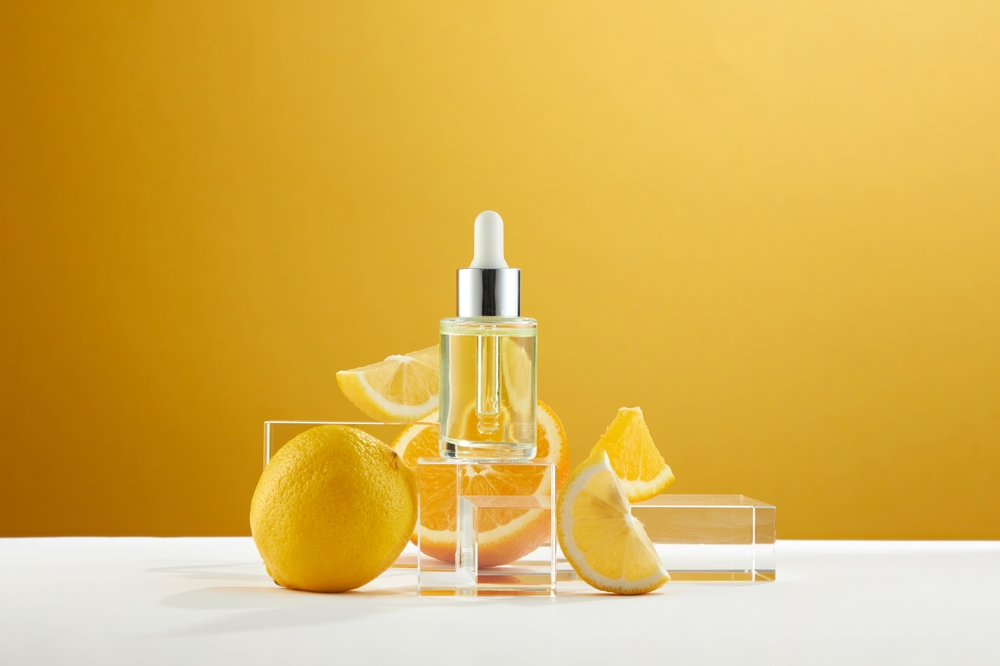Vitamin C is a great ally in the aging process. Because the skin produces less and less collagen as we age, we are prone to fine lines, wrinkles, and a lack of elasticity. Its amazing antioxidant properties have an essential role in skin health.
It comes as a stimulant for collagen production, and it helps us maintain smooth and firm skin. Not only does it combat the UV effects, but it can lighten dark spots for a youthful appearance. With a lot of other benefits, vitamin C should be one of your best friends in fighting the signs of aging.
But how can you use it to properly prevent aging?

What you need to know when you use Vitamin C:
It’s good for redness and evening out skin tone
Vitamin C is known for its anti-inflammatory properties, which are related to its antioxidant qualities. This translated into soothing your skin and reducing puffiness. However, there are more situations where this agent can help, like the neutralization of radicals that cause oxidative damage; it’s a boost for the immune system by reducing inflammatory responses. Of course, it also has skin benefits such as minimizing dark spots and reducing redness and irritation, contributing to a clear appearance and a smooth skin tone.
It fits most skin types
You can usually apply Vitamin C to your skin for a long time without any negative effects. A study showed that a concentration above 20% can cause skin irritation, but most skincare products contain between 10% and 20% pure vitamin C, so it’s safe for most skin types.
It’s maintaining a high hydration level
The same study revealed that in most healthy skin and organs there is a high concentration of vitamin C, and it was indicated that the body accumulates vitamin C in circulation. Moreover, ascorbic acid, which is a form of vitamin C, works best for skin absorption.
The one responsible for hydration is magnesium ascorbyl phosphate, another derivative that has been proven to decrease transepidermal water loss and help the skin retain moisture. A study from 2019 found that antioxidant serums containing Deshampsia antarctica extract and ferulic acid, besides Vitamin C, reduced water loss by 19%, which is an outstanding improvement for skin barrier function.
It’s a Hyperpigmentaion enemy
By slowing down melanin production, vitamin C helps fade away hyperpigmentation. Hyperpigmentation tends to appear in the form of sunspots, aging spots, or melasma, a condition that causes melanin to be produced in certain parts of the skin. It also appears in areas of healed acne.
Because it inhibits the synthesis of melanin, it reduces the activity of tyrosinase, an enzyme that causes hyperpigmentation. Vitamin C is commonly used for treating gum hyperpigmentation, but there are not enough studies on this. About the acne topic, there are many treatments available for the hyperpigmentation that comes with it, containing Vitamin C and other ingredients that are going to help you deal with it. However, in case of severe acne, consult your dermatologist before changing your skincare routine.

It helps with dark circles
Vitamin C serums will easily smooth out fine lines by plumping and hydrating the under-eye area. It’s particularly effective at reducing redness and the discoloration associated with under-eye circles. Used in the mesotherapy process, it significantly improves under-eye pigmentation, and a small study from 2019 showed the amazing effects, yet some people experienced a burning sensation.
If you don’t want to try mesotherapy because you’re scared of needles or adverse effects, there are other ways to reduce the under-eye bags, such as using a cold compress or retinol in your routine. Make sure you use products specifically designed for this area because it’s more thin and sensitive than the rest of your skin.
It promotes collagen production
Collagen keeps our skin looking youthful, and as mentioned earlier, it decreases over time. Vitamin C is a superhero when it comes to its ability to boost collagen production. It’s an essential cofactor for two enzymes: prolyl hydroxylase, which stabilizes the collagen molecule, and lysyl hydroxylase, which enhances structural strength. For an extra collagen boost, make sure you eat vitamin C-rich foods and incorporate them into your diet to maintain a radiant complexion.
A skin-sagging potential help
Another fact related to collagen production is sagging skin. Because a vitamin C serum can increase collagen production, it can contribute to keeping your skin firm and keep you away from sagging skin, either from natural aging or oxidative stress and weight loss. You can incorporate a vitamin C serum into your routine to take proactive steps toward keeping your skin youthful and preventing sagging.
Sun-damage adjuvant
Vitamin C protects you against sun damage. It doesn’t work as an SPF; don’t get it wrong. However, exposing ourselves to UV and pollutants leads to oxidative stress, which naturally lowers vitamin C levels in the skin. Especially in sun-damaged or more mature skin, the vitamin C level is lower. Sun damage attacks skin cells and causes a lot of harm to the skin. Packed with antioxidants, Vitamin C neutralizes free radicals, making them harmless. By incorporating vitamin C serums into your routine, you keep it healthy and more resilient.
Soothing sunburns
While reducing redness, vitamin C speeds up cell turnover. This is a process that involves replacing damaged cells with healthy ones. Applying vitamin C combined with vitamin E and other compounds will mitigate UV radiation damage by reducing inflammation triggered by sun exposure. Researchers found that vitamin C is more effective when used in combination with other ingredients and in sun-exposed skin care practices.
This is an amazing serum based on Vitamin C, combined with Hyaluronic Acid, Vitamin E & Aloe that you can introduce into your skincare routine for firming and brightening. You can order it via Amazon, available at a lower price than other sellers.
Healing wounds faster
Considering what we talked about until now, it can’t be surprising that applying Vitamin C topically would speed up healing. It was tried before on sunburns and came up with positive effects in reducing inflammation, scarring, and infection. In 2017, a review showed that taking vitamin C supplements has positive effects on healing by increasing the level of antioxidants in the body and skin. This benefit is specifically related to collagen production, which is essential for wound healing, and boosting it automatically helps a wound heal.

Don’t forget to have a diet rich in Vitamin C, use serums in your skincare routine, and maintain a constant cleaning and protection habit for the skin on your face. Don’t hesitate to use the same steps for your neck and down the chest area. It’s important to keep the whole body nourished and hydrated, so other than adding some drops of a Vitamin C serum in your body lotion that will even out the skin tone and neutralize some radicals from sun exposure, you can also take supplements to keep your organism healthy and boost your immunity system.
Read next: Which Workouts are Recommended for Varicose Vein Relief?










Leave a Reply